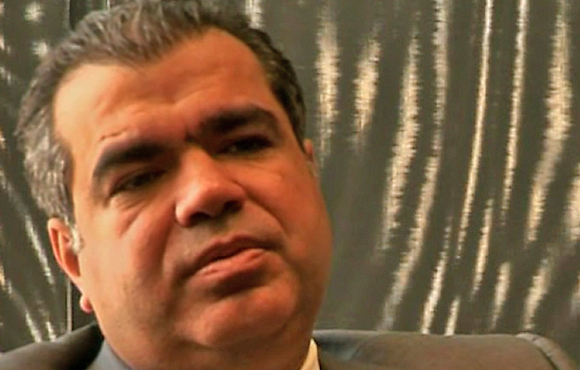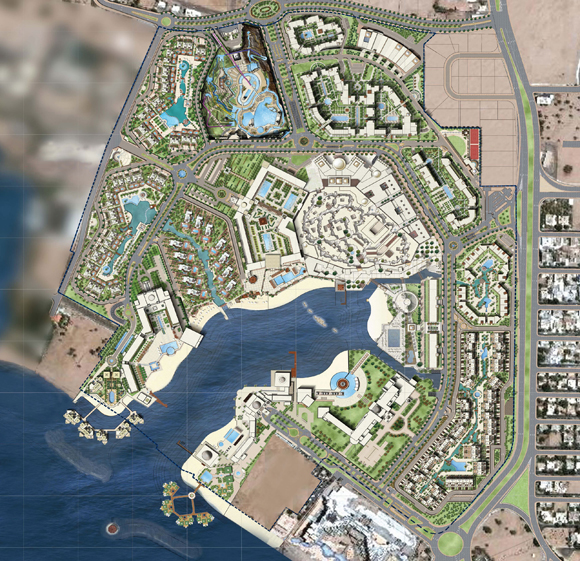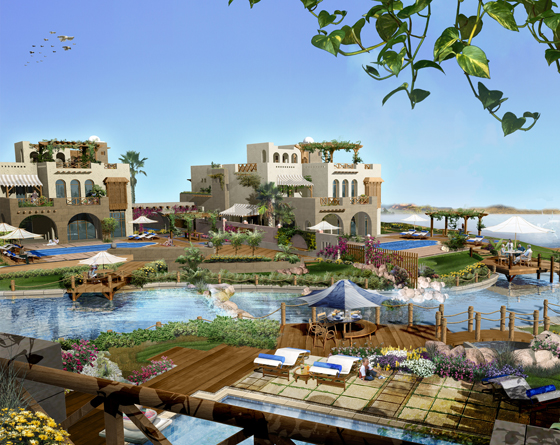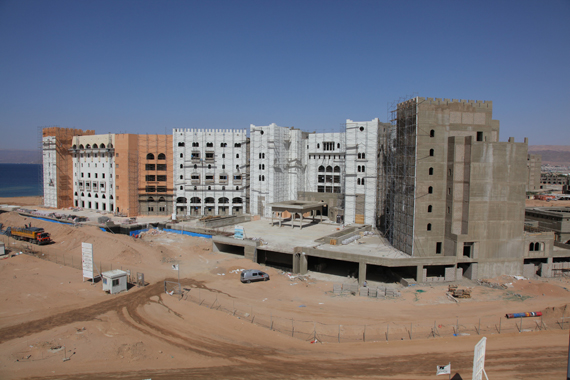Red Sea Megaproject
There has been a sort of freeze in supply and increase in demand which is causing the increase we saw in the first six months of 2010.
Interview with Ali Kolaghassi, Vice Chairman & CEO of Saraya Holdings

How would you describe the current sentiment in the Jordan real estate market and what is the outlook for the future?
If you look at the macroeconomic indicators, we have done pretty well. As you mentioned, in 2009, we went through mayhem all throughout the globe, so the fact that Jordan still managed to achieve growth is quite an achievement. 2.8% is not an upgrade, but it is growth nonetheless. So it’s quite an achievement taking into consideration what happened globally. And as you mentioned, the projections for 2010 are in the 4 to 4.5% range for growth rate. It seems to be pretty good that the indicators so far from the beginning of the year all seem to be encouraging.

We cannot deny that 2008-09 were bad years for the real estate sector in the region, and Jordan was indirectly one of the countries hit with the global recession. It is true that people once again are seeing opportunities. There has been a sort of freeze in supply and increase in demand which is causing the increase we saw in the first six months of 2010. Once again, Jordanian expats are coming back to Jordan to buy in Jordan.
What is your global overview of the real estate sector in the GCC ; what are the new buzz centers ?
We have always believed that hospitality and secondary homes will continue to be demanded in the region, because of the fact that close to 50% of the population in the GCC are under 30. Basically, in the next 5 to 10 years as more people graduate and start having their own careers, they will need a secondary home for entertainment.

Also, the cost of hospitality in Europe and the US constantly increases. If you can offer the same services at competitive rates, the demand will continue to increase. That is why we feel that the value of real estate as an investment will establish good returns for the people who decide to invest here. Globally, I think it’s a cycle. Whenever you have great years like 2006-07, ultimately you will have a freeze or a crash, but things will start picking up again.
Do you think the Jordanian market might be inflated by speculators or is it genuine demand driving the growth ?
“I think what makes Jordan different from Dubai,
for example, was that the speculation was done
by locals for their own personal use.
Also, most people use cash as a means of acquiring real estate, and that is why when prices went down with the freeze, most people decided not to sell or to buy.
You have just approved a capital increase. What was the reason for this move and what are your expectations for it ?
In our minds we had a different ratio of debt versus equity. In today’s market, banks are no longer flexible when it comes to lending to real estate projects. That is why it was very important for us to increase the capital to obtain the necessary debt needed to complete this project. We successfully completed this capital increase of 300 million dollars. We are finalizing our debt requirements and hope to launch by the end of 2012. We are committed to deliver and meet the expectations of our investors and buyers.
How are you facing the changed market conditions ?
The demand for luxury and service has not changed. Although it is a bit challenging, yet the demand for sales will start to rise again. There are always different profiles for buyers and hotel guests; just as there is demand for 3 and 4 star hotels, the demand for luxury will always be there.
What about the rising competition though ?
I think that the more we have hotel rooms in Aqaba, the better it is for all the operators and developers. For Aqaba as a city to become a destination, we need to see at least 5,000 keys for 5 star hotels, to have the big operators focus their attention on Aqaba. Aqaba still needs more international exposure. There are plans to expand the airport; with the relocation of the port, this is an important strategic step with the beachfront of the northern part of Aqaba. In the next 3 years you will have more hotels opening which will provide the potential visitor with a variety of hotels to choose from.
What procedures help you to determine « rich, undiscovered destinations , » as you mentioned ?
It is a combination of factors, the most important element being for the location to have good potential. That is what we saw in Aqaba. Behind Aqaba are Petra and Wadi Rum, which add value to any potential visitor to Saraya Aqaba. No other city can compete by having these 3 elements : a beachfront, water park, and entertainment as well as Petra and Wadi Rum.
How do you see the challenge of developing sustainable tourism here ?
Word of mouth is very important. It is the responsibility of us as Jordanians to promote Jordan by providing accessibility, air transportation, the support bureau offices, signing strategic alliances with international tour operators so they all start focusing on Jordan as a destination for various types of tourism, be it historical, leisure, medical, etc. We are at the beginning of the cycle and we need more investment in this process, as well as coordination between government bodies. The private sector has to be involved too. Jordan is a country where the public sector is very keen on supporting the private sector. His Majesty the King is also involved in every aspect of helping Jordan.
How would you define Saraya Holdings’ strategy for the next five years ? What is your vision ?
We have not changed our vision since the launch of the company back in 2005, but we understand where the market is heading and we had to adjust our expansion plans. Our current focus is on completing our two main projects in Jordan, the Saraya Aqaba and the W Hotel in Amman. We are also focused on completing our project in Muscat, Oman, and ultimately as the market adjusts we will look into other opportunities. We have a project on hold in the UAE, until we see how the market develops. There are so many opportunities available.

Can you talk a bit more about the specifics of Saraya Aqaba ?
We are offering a mixed-use resort that has five hotels, along with a water park, a sports center, retail, a beach club with an amphitheater for concerts, as well as children’s entertainment. You can fish, scuba dive, swim, take your boat out. We have a variety of spas in every hotel as well as a Turkish bath. It is a place where every member of the family can select the kind of activity they prefer and enjoy it all being in a sort of gated community.
What are going to be some of your 2010-11 announcements ?
One important 2010/2011 announcement is that Saraya Aqaba has increased its capital, has obtained its necessary debt for the project, and can confidently tell our investors that we will launch this project by 2012. This reconfirms that we had worked hard to overcome all challenges and we are going to deliver. Once we deliver we move our focus on to another destination where we bring back the original vision for Saraya : to have a multitude of destinations all carrying the same brand, offering the same level of services.
What is your position on corporate social responsibility ?
It is the responsibility of any developer to become an active citizen in the community where they operate, especially when it’s a mega-sized project that is taking something as important to the community as a beachfront. At Saraya we have been very active in initiatives that support Aqaba and the community there, to improve the level of education, the environmental awareness and the quality of life of the communities; the scholarship fund for example aims at building skills that meet Aqaba’s current and future needs in the hospitality sector; we sponsored students from Aqaba where they went for college degrees in hospitality to become employees of the Saraya Aqaba family upon graduation. We also adopted public schools to enhance the educational level and create awareness on the importance of tourism and how it can affect them in the future, hoping that more and more of them would choose hospitality as a career and join Saraya as future employees.

We also looked at Aqaba from an environmental perspective, getting involved in making it a greener city. Developing environmentally sensitive designs such as; use of grey water for irrigation, use of solar energy for water heating, hold Environmental Impact Assessment studies, adopt mitigation measures that aim not to affect natural water reservoirs, and apply arid landscape principles in our landscape designs.We have so many other initiatives which have created a positive impact on the local community. It is important to know that we have allocated funds to give back to the community.
What about the issue of the wealth of college graduates who don’t have the vocational training in the tourism sector ?
Saraya Aqaba is going to create about 5,000 direct job opportunities once it opens. This will have a major impact on the local community. Vocational training is extremely important so that these employees will be able to join us and offer the services that the customers will enjoy and require as part of this luxury program. In hospitality, you are not allowed to make mistakes. Guests want to enjoy the quality of your services; if they leave with a good perception, ten will follow! But if they leave with a bad perception, we will lose ten potential clients.
• support candidates from the Vocational Training Center (VTC) to conduct trainings in hospitality management at the Emirates Academy
• support for the development of the management plan of the VTC in collaboration with the Ministry of Labor to enhance the quality of learning